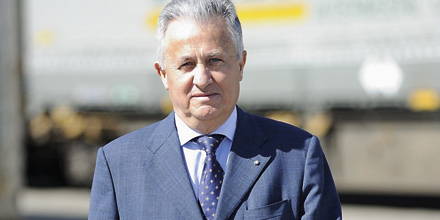An intermodal pioneer - Livio Ambrogio (ITJ) 20/11/19
< ZurückSource: https://www.transportjournal.com/en/home/news/artikeldetail/an-intermodal-pioneer.html
+ read also https://www.mokazine.com/read/mobilitypress/mobility-magazine-220
An intermodal pioneer
The logistician Ambrogio, headquartered in the northern Italian town of Gallarate, near Milan, was established 50 years ago. Livio Ambrogio, the family enterprise’s president, gave the ITJ an interview recently, in which he discussed the firm’s early years as an intermodal transport pioneer and what its strategy is to meet demand today.
Ambrogio was quick to react to the great opportunities created by the introduction of box containers in European logistic markets around 1968. Whereas combined transport on the continent at first developed mainly by loading trailers onto pocket wagons, we chose a more efficient system based on swap bodies on flat wagons, which provided us with a much better net ratio between cargo and empty weight. Then two generations of family members migrated abroad over the years, to various European countries, thus allowing our company to last and to maintain its independence.
The logistics world is changing fast. What do you consider the biggest differences between Ambrogio in 1969 and in 2019?
When we decided to focus on combined transport, operators and the requisite infrastructure were not ready for it yet. Terminals were part of railway stations adapted for the new mode, mobile lifting equipment had to be imported from the USA, wagons as we have them today simply didn’t exist, there were no fully intermodal trains. We had to build our own system. Today we have a choice of rail operators and all sorts of wagons and lifting equipment available.
Ambrogio was an intermodal pioneer from the very beginning. What are the future challenges in intermodal transport?
In the early years the acceptance of combined transport was tied mainly to the fact that it was cheaper. Today the modal switch is on the political agenda in every developed country and the demand for sustainable transport is growing year by year. The challenge is to provide adequate infrastructure for freight transport, which presently has to share infrastructure (and fight for it) with passenger transport, creating higher costs with less quality.
Ambrogio remains a family business. What are the advantages, and maybe the disadvantages, of this structure?
In the start-up phase, the family provided dedication, mobility, helpfulness, endurance through hard times and tight company governance. Growing up, family members now hold one or more of various positions: shareholder, manager, employee. Peaceful compliance with this reality is a key factor for the continuity of the firm and of Ambrogio’s family spirit.
In October Ambrogio launched a new connection between Bayonne and Paris. What’s the goal of this new connection?
This new connection allows us to expand our intermodal offers in France and to meet growing demand. Thanks to this new line we now serve the Paris area, the north of France and the Benelux countries from the Aquitaine region.
What is Ambrogio planning for the coming years, to continue with the company’s overall success story?
Our mission is to continue to contribute to assist the development of combined transport in Europe. We’ll carry on our policy of strong investment in our own intermodal terminals, wagons and swap bodies, and we’ll also continue to focus on expanding our coverage across Europe by opening new lines.






